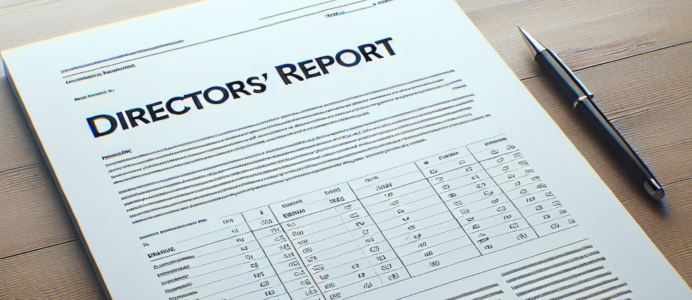After every financial year, all registered companies are legally obligated to submit annual accounts detailing their financial activities to Companies House. A directors’ report is part of those accounts. If a company is dormant (not trading) or qualifies as a micro-entity, it doesn’t need to file a directors’ report.
In the blog below, we explain more, including what a directors’ report is and what information it contains. We also clarify who is responsible for preparing and filing the report and the benefits of doing so.
Key Takeaways
- A directors’ report is part of the annual accounts that small, medium, and large companies must prepare each financial year. Micro-entities and dormant companies are exempt.
- Directors prepare the report, providing an overview of the company’s performance during the financial year. It includes information such as the recommended dividend, financial risk management objectives, and employee engagement policies. Depending on their size, some companies may be subject to additional requirements.
- A company’s first set of annual accounts (along with a directors’ report) is due at Companies House 21 months after incorporation. After that, the filing deadline is no later than 9 months after the accounting reference date (ARD).
What is a directors’ report?
A directors’ report is an overview of the company’s performance during the financial year. It’s a supplementary document to the annual accounts, which the directors prepare and file each year with Companies House.
One of the primary purposes of a directors’ report is to maintain good communication between the shareholders (also known as members), who own the company, and the board of directors, who run the company day to day on behalf of the shareholders. The directors’ report helps the shareholders assess whether the board has fulfilled their duty to promote the company’s success and keeps them in the loop about business performance.
Companies House also uses the directors’ report to evaluate the company’s compliance with relevant laws and regulations and corporate transparency.
Who needs to file one?
Small, medium, and large companies must prepare and file a directors’ report along with their annual accounts every financial year. Micro-entities and dormant companies are typically exempt.
Directors are personally responsible for ensuring the report is accurate and filed on time. Failure to do so is an offence and could result in fines and convictions.
Below is a comparison of the criteria for micro, small, medium, and large companies.
| Micro company | Small company | Medium companies | Large companies | |
| Annual turnover | Up to £1m | Up to £15m | Up to £54m | More than £54m |
| Balance sheet total | Up to £500,000 | Up to £7.5m | Up to £27m | More than £27m |
| Average number of employees | No more than 10 | No more than 50 | No more than 250 | More than 250 |
What should a directors’ report include?
The contents of a directors’ report are set out across multiple pieces of legislation, including the Companies Act 2006, the Small Companies and Groups (Accounts and Directors’ Report) Regulations 2008, and the Large and Medium-sized Companies and Groups (Accounts and Directors’ Reports) Regulations 2008.
As a minimum, most qualifying companies must include the following in their directors’ report:
- The names of all the directors during the financial year
- Details of any political donations over £2,000 made during the financial year
- Disclosure of any third-party indemnity provisions
- Disclosure of any pension scheme indemnity provisions
Additional information may be required depending on the company size.
Medium and large companies
In addition to the above requirements, medium and large companies must also disclose a dividend recommended by the directors and a description of the actions the company has taken to:
- Regularly consult employees and provide them with financial and economic information that may affect them
- Encourage employee engagement via share schemes or other means
- Make employees aware of the financial and economic factors affecting the company’s performance
They must also confirm:
- Whether the company has any branches outside the UK
- That auditors and directors have been made aware of all relevant information
- The company’s financial risk management objectives and policies
- Any price, credit, liquidity, or cash flow risks
- The details of any significant events affecting the company since the end of the financial year
- The likely future business developments
- The company’s research and development plans (if any)
Large companies only
Large companies must also report:
- How they’ve maintained good business relationships with key stakeholders, such as suppliers and customers, during the financial year
- Environmental matters, including greenhouse gas emissions, energy consumption, and energy efficiency (other companies, including public companies, have different and much more comprehensive rules on this)
Example:
To see an example of a directors’ report, simply search for a company on the Companies House register. Click on their name, go to the ‘Filing History’ tab, and tick the ‘Accounts’ category. You’ll then see the company’s historic annual accounts, which contain the directors’ report (if they qualify to prepare one).
How does a directors’ report differ from a strategic report?
Both reports supplement annual accounts and include similar information. However, they have some key differences.
A directors’ report is more compliance-focused. It allows the board to demonstrate statutory compliance whilst outlining the company’s operational details, commercial health, and performance.
Meanwhile, a strategic report focuses on the company’s strategy (including non-financial performance), future outlook, and potential risks to achieving its goals. Put simply, a directors’ report assesses business performance from the previous financial year, and the strategic report looks ahead to what the company wants to achieve next.
A directors’ report is also primarily for the shareholders, while a strategic report is designed for the shareholders and other stakeholders, such as employees, customers, and regulators.
Here is some of the key information you’d find in a strategic report:
- A balanced and comprehensive overview of the business model and strategy
- A description of the risks the company may be facing and any trends or factors that could impact its future development
- The company’s position during the financial year in relation to its key performance indicators (KPIs), financial and non-financial
That said, both reports overlap in certain areas, so they can contain the same information if deemed relevant.
Filing and circulating a directors’ report
We explained earlier that a directors’ report is filed with the annual accounts. How and when you need to deliver those to Companies House depends on your company type and age.
If you’ve just formed a private limited company, your first set of annual accounts is due within 21 months of incorporation. This should cover the 12-month period between your incorporation and accounting reference dates (ARD). All subsequent filings must be within 9 months of the ARD.
Meanwhile, public limited companies (PLCs) must file their annual accounts within 6 months of the relevant ARD.
Benefits of filing a directors’ report
While filing a directors’ report is mandatory for qualifying companies, it shouldn’t be seen purely as a legal requirement. Some of the main advantages of writing a directors’ report are:
- Communication: It’s crucial that the board of directors communicates clearly and effectively with the shareholders. The directors’ report is integral to successful communication, as it provides the shareholders with a regular update on the company’s performance and what the board is doing to keep the business on a positive path.
- Transparency: A directors’ report helps maintain strong corporate transparency. This is essential for legal compliance and open and honest communication with shareholders.
- Planning: Identifying potential risks and challenges that could impact the company’s future performance is vital for planning how the directors intend to overcome them.
- Information: A directors’ report may include important information not available elsewhere in the annual accounts. This ensures that shareholders are always kept up to date and never miss any business updates.
Wrapping up
Running a UK-registered company involves certain legal obligations, such as preparing a directors’ report and your annual accounts. Hopefully, you’ve found this blog helpful in understanding what a directors’ report is, what it involves, and how to file one.
If you have any questions about this report or any other filing requirements for limited companies, please leave us a comment below. Alternatively, take a look at the Quality Company Formations Blog for more articles like this.
If you’re a future director and need support with setting up your limited company, visit Quality Company Formations.
Please note that the information provided in this article is for general informational purposes only and does not constitute legal, tax, or professional advice. While our aim is that the content is accurate and up to date, it should not be relied upon as a substitute for tailored advice from qualified professionals. We strongly recommend that you seek independent legal and tax advice specific to your circumstances before acting on any information contained in this article. We accept no responsibility or liability for any loss or damage that may result from your reliance on the information provided in this article. Use of the information contained in this article is entirely at your own risk.












Join The Discussion
Comments (2)
Excellent article! It was good to know this info on directors report for my own financial services UK business.
Thank you for your generous feedback, David.
We’re happy to hear that our most recent blog was to your liking.
Kind regards,
The 1st Formations Team.